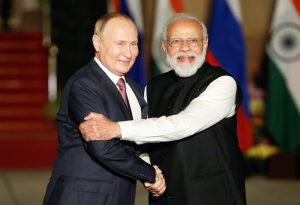Sanctions imposed on dozens of Russian banks by the US Treasury last week have spurred a sharp fall by the Russian ruble, with the country’s central bank forced to step in to support the currency.
The ruble dropped to 114 to the US dollar, its lowest level since March 2022, just after the Russian military invaded Ukraine.
The Central Bank of Russia (CBR) said it would stop foreign purchases of the ruble on the domestic currency market for the remainder of this year “in order to reduce the volatility of financial markets.”
ALSO SEE: Adani Case Exposes Flaws in India’s Clean Energy Rollout
The central bank’s move helped the ruble rise to about 110 to the dollar early on Thursday, but some commentators said the ruble was in “free fall” and that the CBR’s intervention was “a bid to stem panic.”
“Close followers of Russian geopolitics and macroeconomics say the weakening ruble points to a fast-deteriorating economic situation for Moscow,” CNBC said.
“The central bank has already raised interest rates to 21%, but this has so far failed to tame rampant price increases, with the inflation rate at 8.5% in October, while the price of basic foods, such as butter and potatoes, has soared over the past year,” it said.
Last week, the US Treasury’s Office of Foreign Assets Control (OFAC) imposed sanctions on Gazprombank, plus more than 50 internationally connected Russian banks, over 40 Russian securities registrars and 15 Russian finance officials.
It said the move aimed to “to curtail Russia’s use of the international financial system to further its war against Ukraine” and to “degrade Russia’s war machine.”
The OFAC also issued an alert on sanctions risks related to Russia’s System for Transfer of Financial Messages (SPFS), which the Kremlin uses to evade sanctions.
“This sweeping action will make it harder for the Kremlin to evade US sanctions and fund and equip its military,” Treasury Secretary Janet Yellen said.
The notice described Gazprombank as a conduit for Russia to purchase military materiel for its war effort, noting that Moscow “uses Gazprombank to pay its soldiers, including for combat bonuses, and to compensate the families of Russian soldiers killed fighting Putin’s brutal war against Ukraine.”
Australia, Canada, New Zealand, and the United Kingdom have already sanctioned Gazprombank (GPB). But the US did not impose sanctions earlier, allegedly because GPB was used by European entities that buy Russian gas.
Other institutions hit by the US move include the Luxembourg-based GPB International bank, GPB Financial Services Hong Kong Ltd, GPB Financial Services Ltd in Cyprus, GPB-DI Holdings Ltd, Gazprombank (Switzerland) Ltd, and the South Africa-based GPB Africa and Middle East Pty Ltd. All were described as wholly-owned GPB subsidiaries.

The US move is seen as a belated bid by the Biden Administration to pressure the Kremlin before Donald Trump re-enters the White House.
The Russian economy has managed to grow during the war because of a surge of oil and gas exports to countries such as China and India, which have taken advantage of discounts offered by Moscow, but the IMF has warned of a sharp slowdown in 2025 because of a drop in consumption and other factors.
Kremlin spokesman Dmitry Peskov has downplayed the currency drop, saying ordinary Russians still receive their pay in rubles.
But economists have noted that the latest sanctions make it harder for Russia to conduct foreign trade, as sources of foreign exchange dry up, and that the ruble has fallen 35% since August, while inflation is hammering the domestic economy.
A list of the banks and officials affected by the US action can be found here.
- Jim Pollard
























